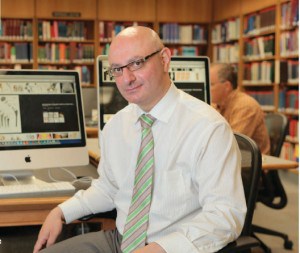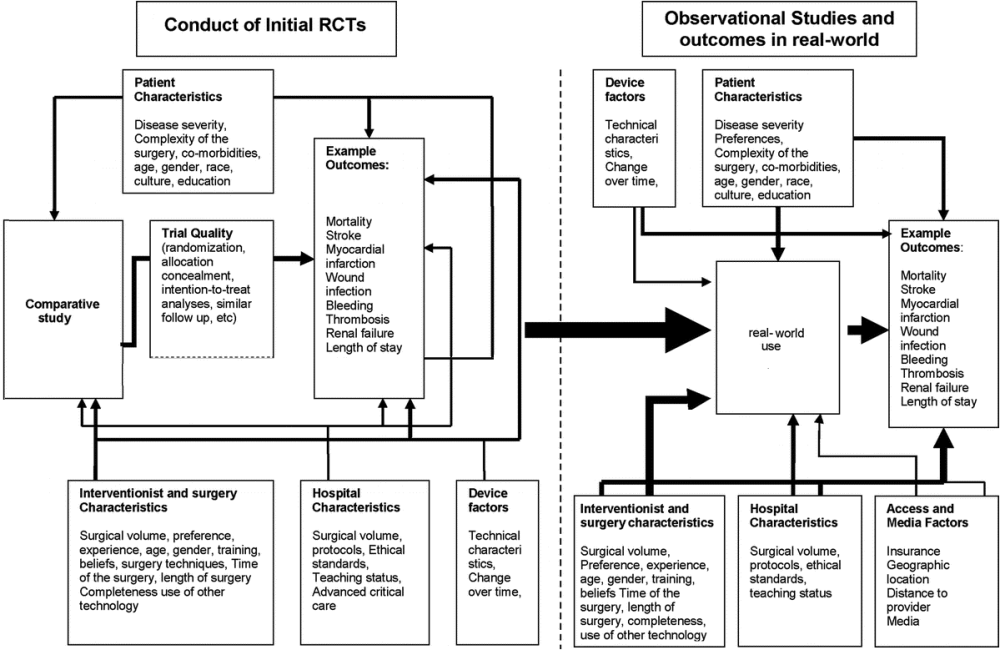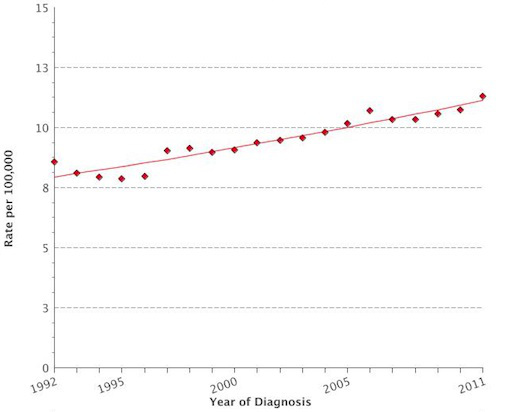Dr. Art Sedrakyan Develops Framework for Comparative Effectiveness Research in Surgery

Dr. Art Sedrakyan, M.D., Ph.D., director of the Patient Centered Comparative Outcomes Research Program at Weill Cornell Medical College and a longtime health services researcher has begun working with members of the CADC and Department of Surgery to improve and increase studies of surgical outcomes and comparative effectiveness.
Surgical comparative effectiveness research (CER) studies face hurdles when implementing basic research concepts such as randomization, blinding, and allocation concealment. Factors such as device-operator interaction and technical complexity also play a major role in outcomes, but are not easily measured. Based on prior work, Dr. Sedrakyan has devised a conceptual framework for CER in surgery. This framework aims to allow for the identification and evaluation of several factors unique to surgical CER research, which should be considered and accounted for when designing these studies.
Key components of the framework are:

- The role that characteristics of techniques and devices play in surgical outcomes. Complex approaches and specific device characteristics, all underscored by the constant evolution of tools and techniques, can have substantial impacts on reliability and consistency, which makes assessment of safety and effectiveness difficult. In order to accommodate these issues, the framework highlights the necessity of documentation of approaches and techniques, and reasoning for these choices in order to assess and interpret relevant outcomes.
- The role that characteristics of the operator play in outcomes. Different operators present different preferences, skill, and interpretations, which have substantial impacts on technological adoption in the real world. These preferences may be driven by institutional or financial concerns, volume, patient population, or even sheer habit. The framework highlights the role that learning curve plays in technological adoption and advancement in surgery.
- The role of individual patient characteristics. Since initial trials are often conducted in highly controlled, carefully selected patient populations, real world adoption often substantially widens the pool of patients receiving a certain technique or device. This diffusion of new technology often has a significant effect on outcomes.
Though the framework does not solve all of the challenges inherent to surgical CER research, it presents a helpful resource for those interested in advancing comparative safety and effectiveness of surgery and devices. The hope is that through improved awareness of these key methodological issues, future studies can account for these factors, and potentially improve their designs to limit the impact these issues will have on their results.
For more information on this framework:
Sedrakyan A, Marinac-Dabic D, Normand SL, Mushlin A, Gross T.A. Framework for evidence evaluation and methodological issues in implantable device studies. Med Care. 2010 Jun;48(6 Suppl):S121-8.
Recent Faculty Additions: GI Surgery
In the interest of building connections between providers across NYP, the CADC Research Spotlight plans to highlight faculty who have recently joined the Center for Advanced Digestive Care, and share their areas of clinical and research interest.
This issue’s spotlight is on GI surgical faculty who have joined in the past two academic years:

Specialties
General Surgery
Affiliations
NEWYORK-PRESBYTERIAN HOSPITAL
Specialties
Hepatobiliary Surgery and Transplant Surgery
Affiliations
NEWYORK-PRESBYTERIAN HOSPITAL

Specialties
Surgery
Affiliations
NEWYORK-PRESBYTERIAN HOSPITAL
WCMC’s Department of Healthcare Policy and Research and Department of Surgery Find Alarming Increase in Early-Onset Colorectal Cancer
A collaborative study initiated by Manish A. Shah, MD, Director of WCMC’s Gastrointestinal Oncology program, involving the WCMC Departments of Healthcare Policy and Research and the Department of Surgery gives more insight into the changing face of colon cancer, revealing that while rates of incidence among the target surveillance audience of men and women over 50 have dropped since 2000, patients under 50 are seeing a 1.4% annual increase in incidence.
Using the Surveillance Epidemiology and End Results (SEER) database covering 18 registries, approximately 40,000 early-onset cases and 330,000 late-onset colorectal cancer cases were studied by Xi Emily Zheng, PhD, MD, general preventative medicine resident in the Department of Healthcare Policy Research, Heather Yeo, MD, MHS, assistant professor of surgery and assistant professor of public health, Doron Betel, PhD, co-Director of the Core Epigenetics Lab, and Dr. Manish Shah.
By comparing patient and tumor characteristics for both groups, certain attributes were discerned for early-onset cases:
- Early-onset colorectal cancer is more likely to occur in males than females
- Blacks and Hispanics have 1.6 times higher risk of getting colon cancer before 50 than whites.
- Colorectal cancer in early-onset patients is more likely to be present in the left-sided colon or rectum.
- Most alarmingly, early-onset colorectal cancer is more likely to present at a higher grade and more advanced stage than late-onset colorectal cancer.

Despite adenocarcinoma remaining the predominant histology for both early-onset (63%) and late-onset (65%) colorectal cancer, signet ring cell carcinomas and mucinous adenocarcinomas are found more often in in early-onset than late-onset. Early-onset patients had larger tumor sizes and higher rates of lymph node positivity and perineural invasion, plus positive surgical margin.
“This is an important study that may elucidate genetic causes for the more aggressive type of colon cancers characteristic of early onset disease. This work can only be accomplishsed by the close collaboration with multiple involved research groups,” explains Dr. Shah.
A new rising face of colon cancer is a Black or Hispanic male under 50, with cancer in very advanced stages. While this profile does not fit the whole population still affected by the disease, it does represent a population being missed by current screening standards. Research on the pathogenesis of early-onset colorectal cancer may provide more insight to the similarities or differences between early- and late-onset colorectal cancer, which in turn will inform improvements in screening and detection. Drs. Yeo, Zhang, Betel and Shah are continuing to explore additional potential molecular differences between the two groups using TCGA.
Center for Advanced Digestive Care Welcomes Genetic Counselor

The CADC’s goal of providing patient-centered care includes providing free support services to patients beyond the doctor’s visit. These services range from nutrition counseling to social work. Most recently, the Center expanded its patient offerings to include genetic counseling.
Francesca Tubito, MS is a genetic counselor whose areas of expertise include hereditary gastrointestinal cancer syndromes such as Lynch syndrome and familial adenomatous polyposis syndrome, among others. Francesca manages the CADC’s hereditary GI cancer registry and is dedicated to patient-centered care. Francesca studied genetics at Rutgers University and genetic counseling at Long Island University-Post before joining the Center for Advanced Digestive Care as a genetic counselor.
Consultations with Francesca are free of charge to patients of CADC member physicians. To schedule an appointment with Francesca, please call the CADC referral center at 1-877-902-2232.
SEED Grant Updates
The Center for Advanced Digestive Care provides grant funding for pilot projects by researchers at WCMC and beyond. The CADC recently closed submissions for its fourth round of pilot grants, also known as SEED grants. Here is an update on two investigations funded by earlier rounds of grant funding:
- Todd Evans, PhD. received a CADC SEED grant to investigate therapeutic targeting of pancreatic cancer cells. Addressing pancreatic cancer’s high resistance to therapy, and the scarcity of effective drugs for the treatment of advanced pancreatic cancer, the aims of this study were to isolate pancreatic cancer tumor initiating cells expressing a specific embryonic progenitor marker, and then to identify drugs which have the potential to target pancreatic cancer tumor initiating cells. Despite an early setback in identifying progenitor cells, the project led to the effective development of several lines of drug resistant cancer cells which will help model stem cells that fail to be targeted by standard treatments. More information from this ongoing study will be reported in future issues.
- Dr. Samie Jaffrey, M.D., Ph.D. led a pilot project focusing on the inhibition of mRNA demethylation as an alternative to standard therapeutic strategies for IBD. The goal was to assess if inhibiting the FTO enzyme would have anti-inflamatory effects. However, FTO has traditionally been difficult to work with, due to the cumbersome assay. The project was successful in developing and optimizing a simple assay for FTO, which would allow for high throughput screening and use in IBD models. While the project suffered a slight delay early on, work continues and should allow for testing in IBD models in the future.
The CADC is pleased to announce the fifth round of funding for pilot research projects. We encourage those who did not receive funding in the first rounds to reapply. This funding period will involve two tiers and bridge funding for previous pilot project grant recipients.
View the RFA and more information on how to apply. Deadline for submission is September 18, 2015.
Please contact Bridget McClure at 212-746-5578 with any questions.




